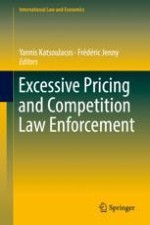2018 | OriginalPaper | Buchkapitel
Working Out the Standards for Excessive Pricing in South Africa
verfasst von : Liberty Mncube, Mfundo Ngobese
Erschienen in: Excessive Pricing and Competition Law Enforcement
Aktivieren Sie unsere intelligente Suche, um passende Fachinhalte oder Patente zu finden.
Wählen Sie Textabschnitte aus um mit Künstlicher Intelligenz passenden Patente zu finden. powered by
Markieren Sie Textabschnitte, um KI-gestützt weitere passende Inhalte zu finden. powered by
